Energy Savings Plus Workforce Development Aids Companies, Students
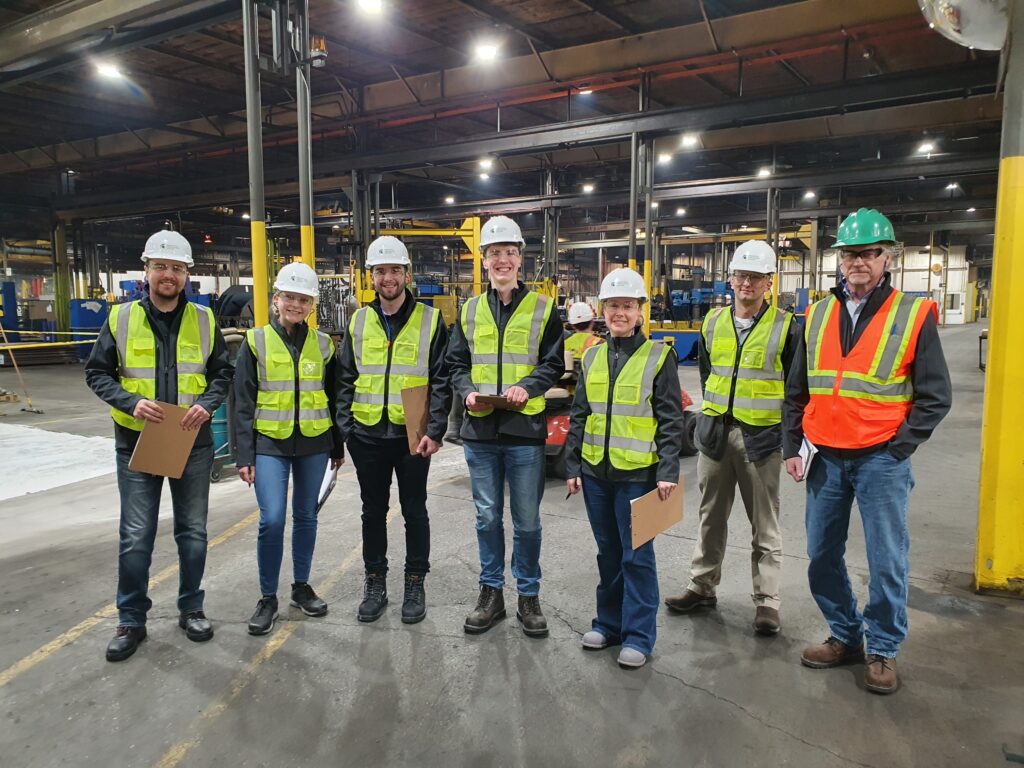
The Industrial Assessment Center (IAC) at Michigan State University, in collaboration with Michigan Technological University and Henry Ford College, offers the 6,200+ small and medium manufacturers (SMEs) in Michigan free technical assessments to help save energy, improve productivity, reduce waste, and reduce carbon emissions. As a result, the institutions are helping to build and expand a knowledgeable and diverse energy workforce pipeline. The scope of topics covered includes: – Energy and water savings – Smart manufacturing – Energy management – Cybersecurity – Resilience planning – Decarbonization – Electrification SBN Detroit spoke to Dr. Kristen Cetin, associate professor at MSU in the Department of Civil and Environmental Engineering. She also is the director of the MSU Industrial Assessment Center. Q: Tell me about the Industrial Assessment Center A: We are a U.S. Department of Energy-funded center focused on two things: First, we support small and medium-sized manufacturers and commercial building owners by providing one-day no-cost assessments to identify opportunities to improve and support their energy and sustainability goals. Our second focus is workforce development. Once students graduate they take manufacturing and sustainability and energy knowledge into the workforce. Some students will go on to jobs in manufacturing or energy, and others perhaps not, but will know to integrate what they’ve learned in whatever career they pursue. We are one of 37 IAC centers across the country, and ours is a collaboration between Michigan State University, Michigan Tech, and Henry Ford College. Q: How did the IAC come to be? A: The Department of Energy program has been in existence since the ‘70s to support energy efficiency, and every five years they do a funding call. That’s where it began. Michigan has not had an IAC for about six years. I moved here from Iowa and was surprised that this manufacturing-rich area did not have an IAC providing this service. So, when the funding call came out we applied for Topic 1, which is the manufacturing side, and Topic 2, which is the commercial building side, pilot program. We knew MSU alone couldn’t easily support all regions of Michigan given how big Michigan is. Michigan Tech is surrounded by important and different industries, so they were a natural collaboration to support the northern part of the state. Collaborating with Henry Ford College as a community college helps us to support the Detroit area, as well as to better reach more commercial buildings. This collaboration also enables broader diversity of students to participate in terms of training. So we partnered, and it’s been going very well to date. Q: What does the assessment process involve and how much support do you offer outside of the assessment? A: The assessment process begins with a thorough analysis of utility bills, followed by a one-day in-person assessment. Sometimes we leave datalogger equipment to continue to monitor the operation of energy-consuming systems after the assessment. Once the assessment and analysis are complete a full report is written up including detailed recommendations, estimates of energy efficiencies, and associated costs. We then follow up about a year after the assessment to see what was implemented, if there were efficiencies gained, and receive feedback on what was actionable and what was not. This helps us figure out what we can do better and what kind of impact each assessment has made. In terms of supporting the implementation of our recommendations, we do a few things. If appropriate we contact utility companies to see if there are rebates or incentives that fit well. We also connect interested companies to the Better Plants program, which can help facilitate larger-scope initiatives and provide ongoing support beyond our assessments. And finally, a new development that is just becoming available is a matching grant program to support any company that completes the assessment. Part of the Bipartisan Infrastructure Law implementation, this is a new grant that will match company funds to support implementation of the changes recommended in the post-assessment report. Q: Are all assessments the same or do they vary depending on the building? A: We typically have one day to do them, so to that end we follow a similar schedule and format. But our recommendations and areas of focus vary depending on what kind of manufacturing the company is doing, or what kind of commercial building it is. We do a walk-through in the morning and obtain information about all of their systems in place. At lunch, we brainstorm about areas of improvement, and then we split into groups to dive deeper into those areas throughout the afternoon. Q: How many assessments are done annually? A: We do 30 assessments per year, approximately 20 of which are manufacturers and ten commercial buildings. Q: What is the role of the students? A: This is very much a student-led program. Students are the main point of contact with each of the companies we work with, the lead in the discussions, the lead in data collection, and all aspects of the program. There is a student lead for each assessment, and that person is in charge of setting up the logistics and takes the lead during the assessment. They also present the report and recommendations to the companies we work with. They also lead the student group in creating the report draft review, which is then reviewed and approved before sharing with the company. The faculty and staff in the IAC help to support and generate ideas, provide technical expertise, as well as review recommendations and overall reports. Our student groups range from approximately three to eight per assessment. Approximately 90% of the students are undergraduates from a variety of engineering and non-engineering backgrounds. There is also a three-credit training course that students in the IAC take during their first semester in the program. All students are paid for the work they do, including training. Q: What does it mean to have this practical hands-on experience? A: I think this hands-on training is even more valuable than taking classes. It’s invaluable – this
Joe Louis Greenway Project Aims to Transform Abandoned Rail Corridor into 27.5-Mile Recreational Pathway
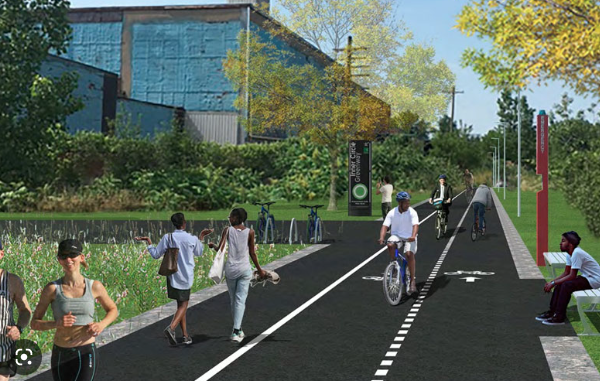
The Joe Louis Greenway is a 27.5-mile pathway that will connect 23 neighborhoods and the cities of Detroit, Hamtramck, Highland Park, and Dearborn to each other and to the Detroit riverfront, Dequindre Cut, Belle Isle, pedestrian/cyclist crossings at the Ambassador and Gordie Howe International bridges, and other trails. Upon completion, more than 40,000 residents will be able to walk to the greenway within 10 minutes. The project is based on a Framework Plan funded by the Ralph C. Wilson, Jr. Foundation and shaped by voices from the community. The General Services Department team led 14 community meetings and attended more than 40 other events and meetings to gather feedback from residents to create the plan. The project is being recognized for its focus on inclusion, and for bringing a wide range of voices to the table while fostering citizen advocacy and activism. In October, The American Planning Association awarded the 2022 Advancing Diversity and Social Change in Honor of Paul Davidoff Award to the project. The greenway has received significant state and federal funding. And earlier this month, the city of Detroit, Detroit Riverfront Conservancy, and Joe Louis Greenway Partnership announced the Unified Greenway Partnership, an alliance that will raise funds to complete the Detroit Riverfront from Belle Isle to the Ambassador Bridge, build the Joe Louis Greenway around the city, and endow both projects for long-term management. SBN Detroit spoke to Brad Dick, COO for the City of Detroit, about inclusion, the use of space for social justice, and the greenway’s potential impact on area businesses and new business development. Q: There is a significant amount of funding from different entities coming in for the greenway. What are your thoughts on the ‘investment in urban spaces’ and the implications this has on small businesses in the area, as well as the opportunities this represents for new business development? A: The Joe Louis Greenway (JLG) is a historic investment across multiple cities and neighborhoods, including Detroit, Highland Park, Hamtramck, and Dearborn. The greenway will transform a blighted, abandoned rail corridor into a beautiful park running through Detroiters’ backyards. To date, the project has removed more than 68,000 cubic yards of debris (which could fill 22 Olympic-sized swimming pools) and nearly 23,000 old, illegally dumped tires from the area, and is investing in permanent infrastructure and beautification that enhances the quality of life and provides equitable access to public resources. Investment in urban spaces brings communities together and provides economic opportunities for local entrepreneurs and businesses to grow and expand, creating jobs, and economic growth, as well as wealth-building opportunities for our residents along the greenway itself and in adjacent communities. Our goal is to make this greenway a destination, which will attract people from all over the region, creating a strong market for existing and new small businesses. The greenway will also provide safe routes, and comfortable connections for both employees and business owners to get to work. Q: How has this project established itself as a model for neighborhood stabilization and for addressing community-based issues as it pertains to social justice? A: Residents have been at the core of the planning process for the Joe Louis Greenway, and hundreds of Detroiters attended community meetings held as part of the Joe Louis Greenway Framework Plan. The Joe Louis Greenway Citizen Advisory Council helped guide the planning process and continues to advocate for the Greenway. The group of dedicated individuals that guided the Framework Plan represented all seven of Detroit’s Council Districts, as well as residents of Highland Park, Dearborn, and Hamtramck, which also touch the Greenway. Joe Louis worked tirelessly to advocate for the rights of Black Americans and to promote social justice in the United States. The Greenway is more than a tribute to his legacy. It celebrates Joe Louis as a role model and as someone whose values can guide this project and the Detroiters it brings together. Q: What are the equitable economic development benefits of this project? A: The JLG is about access – including access to opportunity. Intentional planning, outreach, and action will create economic opportunity for residents in every neighborhood that the Joe Louis Greenway touches. The economic development benefits will include blight reduction and beautification, housing stabilization, preservation of affordable housing, job training, and career opportunities, existing and new small business support, and light industrial development opportunities. The Neighborhood Planning Study, led by Planning and Development Department, will continue the dialogue with the community and focus on opportunities for community and economic development along the Greenway. Q: How will the Neighborhood Planning Study support social justice as well as economic and business/job opportunities? A: As Mayor Mike Duggan has said, the impact of this greenway will extend far beyond the boundaries of the path itself, creating opportunities for Detroiters to thrive. When complete, the greenway will generate jobs and affordable housing opportunities, and ease mobility barriers that have challenged Detroiters for decades. It also will help Detroiters build generational wealth for homeowners by increasing their property values through the beautification and economic investment that the greenway will bring to their neighborhood. Throughout the planning process, residents voiced a need to heal long-standing urban trauma, particularly concerning urban renewal that ultimately displaced Black residents who called those neighborhoods home and whose businesses were torn down. By acknowledging that past trauma, promoting dialogue, and providing new opportunities for healing, the greenway can be a place where Detroiters advance a better understanding of racial justice. Q: How is the greenway helping to build a more sustainable Detroit? A: The design of the greenway incorporates stormwater management to reduce flooding impacts, native meadow plantings to provide bird habitat, and trees throughout to provide shade and help with air quality. Sustainability, however, goes much further than just the environment. This project will impact many facets of sustainability, including public health, economic development, neighborhood stabilization, park access, and connectivity. The Framework Plan ensures that the Joe Louis Greenway will transform the infrastructure that previously divided neighborhoods into one that unites community and reconnects natural systems, catalyzes economic redevelopment, and supports a resilient social network. The
Michigan Green Communities is Moving Community Sustainability Initiatives Forward
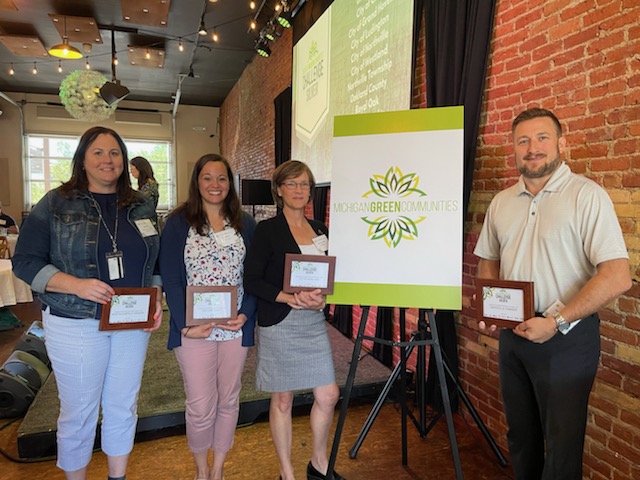
Established in 2009, Michigan Green Communities (MGC) is a statewide sustainability assistance program that works to embed sustainability into municipal and county operations. MGC is a collaboration and partnership of the Michigan Economic Development Corporation (MEDC); the Michigan Department of Environment, Great Lakes, and Energy (EGLE); the Michigan Department of Health and Human Services (MDHHS); Michigan Department of Transportation (MDOT); the Michigan Department of Natural Resources (MDNR); the Michigan Association of Counties (MAC); the Michigan Municipal League (MML); and the Michigan Townships Association (MTA). It is led by a 15-member steering committee from the partners and local governments, including West Bloomfield Township, Ann Arbor, and Canton Township. SBN Detroit spoke to Danielle Beard, Michigan Green Communities coordinator, to find out more about the work it is doing to impact sustainability initiatives in Southeast Michigan and throughout the state. Q: What is Michigan Green Communities? A: Michigan Green Communities (MGC) is a sustainability benchmarking, networking, and technical assistance program for municipalities and counties in Michigan. The goal is to embed sustainability in local government operations and promote innovative solutions at the local, regional, and state level. The main component of the program is the annual MGC Challenge (that’s the benchmarking piece) where communities track in their online accounts whether they’ve completed or are in progress on a set of action items and log metrics (click here for the full list of action items and metrics). Communities that participate in the MGC Challenge have access to free support and technical assistance programs through the MGC program and EGLE’s Catalyst Communities program. Q: What is the impetus behind MGC? A: There are a lot of benefits to embedding sustainability into municipal and county operations. Cost savings is a big driver for communities as they can slash their energy and water bills, helping them control the cost of their operations. Additionally, Michigan’s weather patterns are changing drastically, and local units of government play a large role in adapting our society to these changes. Local policies and decisions can help to mitigate the effects of heat waves, severe snowstorms, massive rain events, and more. Multiple state agencies interact with communities on different areas of sustainability. The MGC program was designed to bring those agencies together to collaborate on how to best meet the needs of local governments. And because local governments are also on the steering committee, they’re providing feedback to state agencies on the challenges they face to inform the agencies’ work. Q: What areas of sustainability are you focused on? A: The Michigan Green Communities program focuses on embedding sustainability into local government policies, programs, and operations. The MGC Challenge action item categories outline this best: Planning for Inclusive and Lasting Impacts Climate Resilience and Adaptation Energy Efficiency & Renewable Energy Responsibly Managing Materials Sustainable Land Use & Economic Development Improving Health Outcomes Protecting & Conserving Water Resources Support Clean & Inclusive Mobility Inspire & Mobilize Residents Q: What examples can you give of the work that’s been done? A: Since it was started in 2009, over 100 communities have participated in various ways and taken steps to advance sustainability in their communities. In our 2021 challenge: 45 communities participated representing 3.6 million Michiganders. MGC awarded 12 bronze certifications, 10 silver certifications, and 23 gold certifications. Over 1,500 sustainability actions were logged as complete, and over 1,000 were logged as in progress. The MGC Challenge added a set of metrics to track data like GHG (greenhouse gas) emissions, community water use, and more. We launched the MGC Accelerator Cohort to advance sustainability practices in bronze & silver MGC Challenge communities. The current challenge is now live, and communities can report on their sustainability actions through the 2023 calendar year. Q: What does the future look like for MGC? A: In short, the future of MGC will involve bringing more technical assistance, resources, and templates to communities to help them expedite resiliency strategies and decarbonize their operations. This will also involve more networking among communities so they can learn from one another and not reinvent the wheel. We launched the MGC Accelerator Cohort in January 2023, which is a group of bronze and silver-certified MGC Challenge communities that come together as a group to address sustainability issues. The first topic that we’re focusing on is green infrastructure. Many communities in Michigan have been dealing with flooding and water runoff causing pollution, fluctuating shoreline water levels, and severe weather events. Green infrastructure solutions can help to address these issues in a way that protects man-made infrastructure and natural features. The group will meet monthly with subject matter experts and consultants that MGC has hired to share ideas, draft ordinance language, and identify potential implementation opportunities and funding for green infrastructure projects. After the green infrastructure module, the cohort will select another topic to work on in a similar style. The cohort is open to any community that has taken the previous Michigan Green Communities Challenge or plans to participate in the current Michigan Green Communities Challenge. This work is being funded by the MEDC. Be sure to subscribe to our newsletter for regular updates on sustainable business practices in and around Detroit.
Helping Detroiters Create New Businesses for a More Equitable World
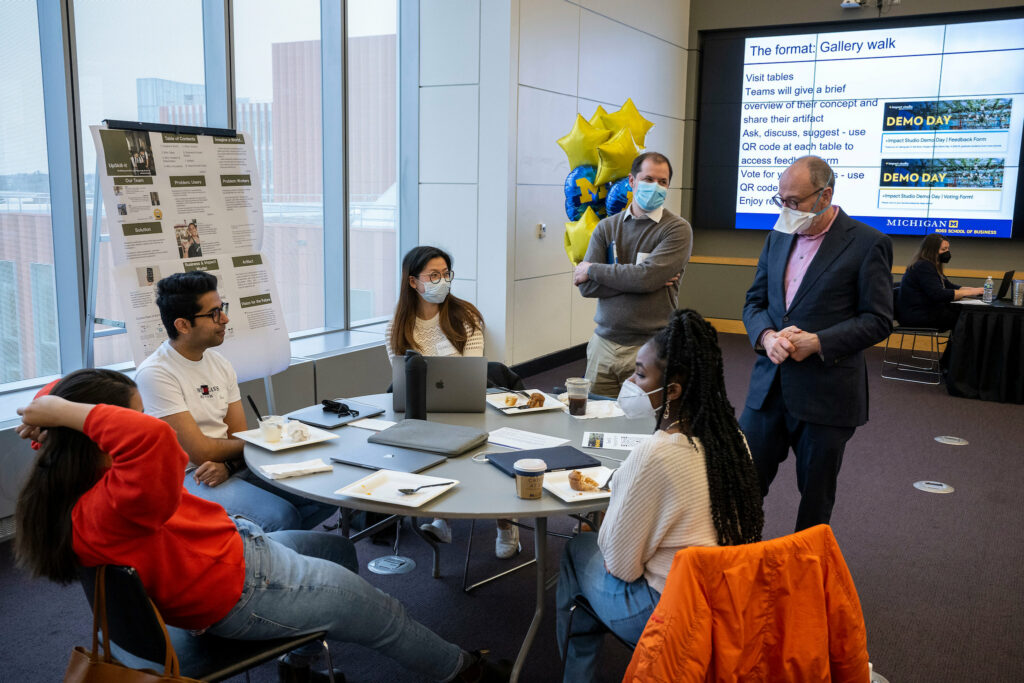
Jerry Davis, Gilbert & Ruth Whitaker Professor of Management and faculty director of Business+Impact at the Michigan Ross School of Business, believes that with more available government funding than in the past, more entrepreneurs and businesses in Detroit are in a position to build equitable community wealth. Davis, who received his Ph.D. from the Stanford University Graduate School of Business and taught at Northwestern and Columbia before moving to the University of Michigan, has published six books and dozens of articles in academic and business publications. His latest book is Taming Corporate Power in the 21st Century (Cambridge University Press, 2022). His focus is reshaping and developing businesses to be drivers of social and environmental change. SBN Detroit spoke to Davis about his perspectives, the new graduate-level class, and what it ultimately means to Detroit businesses. Q: Tell us about your concept of reshaping businesses into drivers of change. A: I think there are two ways we can orient businesses toward a more equitable sustainable future. First, we can take an existing business and reform it from the inside. This is often done by intrapreneurs. Second, we can create new enterprises that are built right from the start. My overall concept is that businesses can address bigger challenges than just shareholder value through reform or fresh starts. There are so many new building blocks available to businesses today that we can leverage to not only make money but also to begin to address the racial wealth gap, generational inequality, and the green energy transition. Q: What do you mean by building blocks? A: Technology has fundamentally changed the building blocks for creating an enterprise in the last fifteen years. There are dozens of new ways to raise capital that didn’t exist ten to fifteen years ago. There are new ways to find distribution channels, new ways to work with suppliers and labor, new legal formats, and the list goes on. Q: How do the United Nations Sustainability Development Goals inform your work? A: Since the inception of the Sustainability Development Goals in 2015, I’ve used them as a GPS of sorts for orienting what businesses can do to contribute to social benefit. I’ve integrated this into my teaching and writing and research. Drilling down …If you had to pick one threat we are facing on a global basis that businesses can work better to address – and that creates business opportunities – it’s the green energy transition. This is the thing in our generation that we need to accomplish starting today. And it’s impossible to address it with government action only. There is a central role for businesses to play in bringing about this transition. And with the Inflation Reduction Act and Justice40 in place, there is no better opportunity to build green enterprises than right now. Q: What are some of the opportunities provided by the Inflation Reduction Act? A: As I said, the need for the green energy transition has never been greater. It is imperative for our species. At the same time, we have the Biden-Harris administration launching the IRA, which creates huge incentives to electrify and transition to green energy. There is an astounding amount of money being allocated to homeowners and renters and drivers to help make this transition. You can simply go online and see the offerings – switching from a gas furnace to a heat pump offers free cash. There are huge tax benefits to electric vehicle owners. And low-income brackets receive even more benefits. I highly recommend the “Rewiring America” website. From a business perspective, this is an opportunity like never before. Businesses that provide services around transitioning to green energy stand to prosper greatly through this funding. These opportunities represent a chance to build generational wealth. Q: Can you explain more about how the act supports generational-wealth building? A: Detroit has been hit hard in several ways … the mortgage crisis, residential flight, municipal bankruptcy, and the list goes on. These have robbed people of opportunities to create prosperity for themselves and their families. So, this funding represents an especially well-placed opportunity for cities like Detroit. According to the White House, the Justice40 initiative means that “40 percent of the overall benefits of certain federal investments flow to disadvantaged communities that are marginalized, underserved, and overburdened by pollution.” That includes “climate change, clean energy, and energy efficiency, clean transit, affordable and sustainable housing, training and workforce development, remediation and reduction of legacy pollution, and the development of critical clean water and wastewater infrastructure.” When you combine the IRA and Justice40, it opens the spigot for cash allocated toward environmental initiatives. So again, the opportunity to start a new business and build community wealth has never been greater than it is right now. This is the impetus behind a new graduate class starting this week called “Impact Studio: Designing the Equitable Enterprise” that I am teaching with my co-instructor Cat Johnson. Q: Tell us more about the class and how you see it impacting both the students and local businesses. A: The class focuses on how to use the new building blocks of business to create enterprises in Detroit that will facilitate the green energy transition. Students will interview dozens of Detroit businesses and members of the community to better understand the needs and pain points around energy. They will then map out the opportunities. For example, let’s say a building contractor is looking to use heat pumps but can’t find someone with the skill to install them, or can’t find a vendor for them. This represents an opportunity. Maybe a college can create training programs for installation. Or find incentives to make heat pumps more widely available. They will then go on to create what I call template business models – plausible, economically sustainable models that are replicable – and a set of how-to guides. The how-to guides will translate into plain English the ways in which entrepreneurs and communities can build on the IRA and the new building blocks of
Through Staffing, Cleaning, and Advocating for the Community, Business Owner is Working to Motivate Detroiters Toward Sustainable Growth
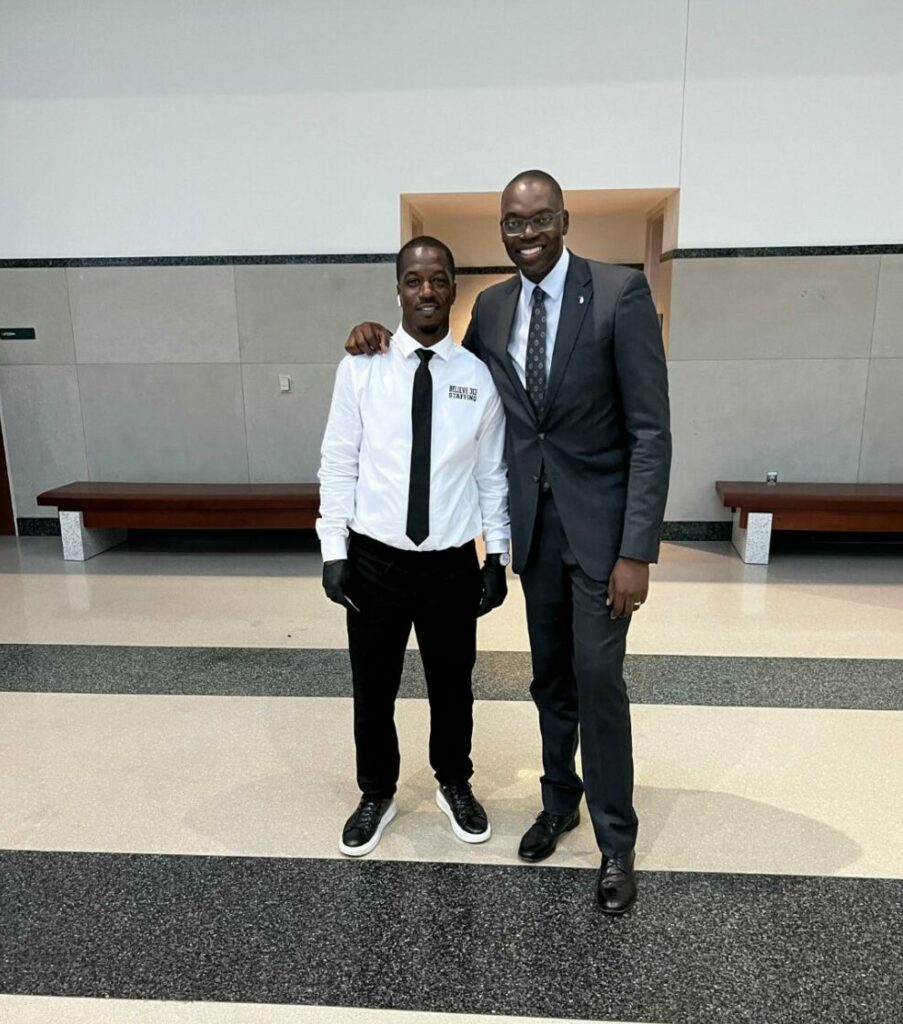
From social justice to getting Detroiters back to work, and even an emerging green dumpster business, Mario Kelly is following his passion for connecting those in the community to sustainable opportunities and inspiring others to follow their business dreams. To that end, Kelly started B3L1EV3 – a motivational-apparel company – several years ago to inspire Detroiters to go after what they believe in. Keeping that sentiment, he then launched Believe 313 Staffing, Believe 313 Cleaning, and soon-to-be Believe 313 Dumpsters. Born and raised in Detroit housing projects, he has been a community activist and liaison for years. Kelly started Believe 313 Staffing in 2017, following that with the launch of Believe 313 Cleaning in 2020, and now holds contracts to do post-event cleaning for Ford Field, Little Caesars Arena, Comerica Park, the Fox Theatre, and Pine Knob Music Theatre. His extended vision for Believe 313 Dumpsters is about diverting commercial and residential waste from landfills in the city of Detroit and beyond. Here he talks to SBND about his businesses, his inspiration, and his continued efforts across areas of sustainability in Detroit. Q: How did Believe 313 Staffing start? A: I grew up in a HUD neighborhood at I-75 and Canfield and nearby was the meat packing company Wolverine Packing. They had received a tax abatement from the city of Detroit to build a storage unit and a park in the neighborhood. Part of that tax abatement required them to hire 50 people from the surrounding area. Owners Jim and Jay Bonahoom came to the community to get insights on what people wanted and to start to talk about hiring. People in the neighborhood referred them to me because I was heavily involved in the community and knew a lot of people. They told me they need 50 people and I brought them 100 applicants. Jay and Jim then began urging me to start a staffing company to help connect people in the neighborhood to opportunities. I thought – what does a kid from the projects without a degree know about starting a business? But they kept advocating for me and supporting me, so I did it, and today it’s a seven-figure business. Q: You’ve been very involved in social justice and community. You started a program called Canfield 75, an effort that aimed to bridge the divide between housing projects in your community. You created a neighborhood Meet Up and Eat Up – a free summer lunch program for students – and you’ve coached and led youth groups in several capacities. Where does your passion come from? A: I’ve always felt that my purpose is helping people. And growing up where I did … you form strong bonds. We had to help each other in whatever we had going on. There is a real sense of community in underprivileged areas. I want to and can get people in the community to work. They are ready and willing to work, and I enjoy connecting people to local businesses and creating opportunities for people to get ahead. My purpose here is to help assist people on their journey to financial stability. It’s a win/win. Q: You grew your staffing company and added a cleaning company – Is that right? A: Yes. I had the concept and business cards – the start of the cleaning company. I was involved with the Detroit Youth Choir and they were invited to take a tour of Shinola that I attended. That was serendipitous because the individuals at Shinola happened to mention that they needed a new cleaning company. I wrote up a proposal and have been cleaning for them since. Eventually, I was referred to Comerica Park, and that opened the door to all of the arenas. I just held a two-day job fair to hire people to clean Ford Field on Thanksgiving. The pay is $22 per hour which is solid. I had 120 people come out for this opportunity. This helped folks earn money to buy Christmas gifts and fulfill other basic needs. Q: What sustainability practices do you follow regarding your work at the arenas? A: We use all eco-friendly cleaning products. All of the arenas have robust recycling practices, and we sort all plastics, cardboard, cans, and bottles for the arena’s recycling companies to then handle. I’m working to convert everything we do as a company to environmentally friendly – such as cleaning products – and a focus on waste diversion. That is the impetus behind the new dumpster company – Believe 313 Dumpsters. Q: Tell us about Believe 313 Dumpsters. A: Living and working in the city, and through the cleaning business, I’ve realized that between residents and businesses we have a lot of dumpster usage in the city. And most of the contents of those dumpsters is ending up in landfills. The goal behind Believe 313 Dumpsters is to recycle and divert as much of the contents of the dumpsters as possible. Q: What does the future look like for the Believe 313 companies? A: Motivating Detroiters in a way that moves people and the city forward in a sustainable way. Whether that’s from a financial and economic standpoint, a social justice standpoint, or an environmental standpoint, for me it’s about creating opportunities for people to thrive. Be sure to subscribe to our newsletter for regular updates on sustainable business practices in and around Detroit.
Rockford Construction – Focusing on the Full Life Cycle of Spaces
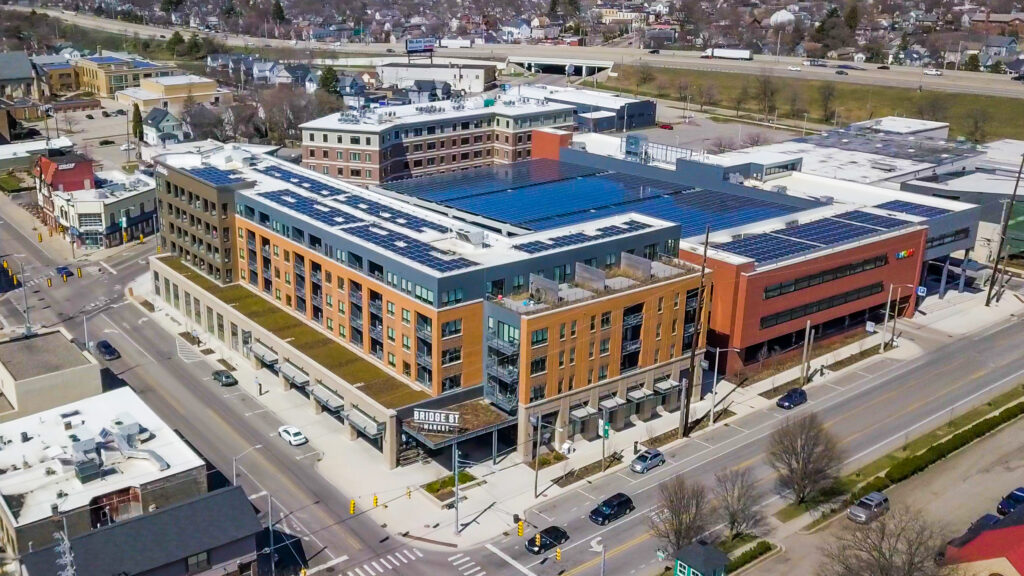
From real estate development to construction and property management, Rockford Construction has been serving the commercial, multiunit, educational, industrial, healthcare, and retail markets throughout the Midwest for more than 30 years. How do they approach sustainability? Mike VanGessel, founder and CEO of Rockford Construction, shares that and more with SBN Detroit. Q: Please tell us about the sustainability practice you have in place. A: Rockford’s current sustainability efforts reflect a “triple bottom line” that is focused on people, the planet, and profit. We consider ourselves to be good stewards of all three of these finite resources. This is certainly a broader view than many people take, but one that is important to our clients and our communities. And we’re not just a construction company. We also develop, own, and manage properties, so our focus extends across the full life cycle of space – not just the initial resources during construction, but the total cost of ownership and the impact our buildings make into the future. As a result, our efforts are quite broad. But each building type brings its own set of challenges and opportunities, allowing us to customize our approach and maximize value to our clients. Q: When did your focus on sustainability come about? A: Decades ago. Rockford was an early adopter of sustainable construction practices. We knew that buildings were a major driver of energy consumption at that time. As a company committed to delivering value to our clients, we recognized that achieving greater energy efficiency would also decrease long-term costs. As the sustainability movement evolved and our knowledge of healthy buildings has grown, our efforts have expanded to include things like water conservation, low VOC (volatile organic compounds)-emitting materials, locally sourced and rapidly renewable materials, and more. Our more-recent triple bottom line approach recognizes that “people” and “profit” are also finite resources, as we’ve seen in our current economy. The shortage of workers – not just in construction but in most industries – has driven a focus on a construction process and end-user facilities that are highly efficient, productive, and attractive to people. The reduction of waste in time and money allows those resources to be deployed elsewhere. Q: What are some examples? A: Over the years, Rockford has completed hundreds of projects that are LEED certified or designed to meet certification requirements. But our approach is applied to all our projects, exploring the building design, systems, and materials to determine the right solution based on client needs, first costs, and long-term operational expenses. The most successful projects result from early involvement and clear goal-setting. One of the best examples can be found in Circuit West, a cutting-edge energy district that encompasses a 13-block area in Grand Rapids. As Rockford was developing and constructing buildings in the area, we partnered with Consumers Energy in their effort to pilot next-generation energy technology. Together, we installed 1,800 solar panels and battery storage capable of producing 500 kilowatts every hour. Power lines were buried, and solar arrays were installed in conjunction with other construction work, greatly reducing installation costs. The result is more reliable, renewable energy for the neighborhood. While Circuit West was a large-scale effort, early involvement allows us to explore all possibilities, uncovering those that make the greatest impact on our clients’ triple bottom Line. Q: What are the drivers behind these practices? A: The driver of sustainability is simple. We are creating healthier, more energy-efficient, and cost-effective buildings for our clients and the people who will live, work, play, and heal inside of them. In the early days, sustainable design and materials were thought to drive additional costs to buildings, and owners had to be deeply committed. Today, a better understanding of good design, appropriate systems, and more readily available sustainable and renewable materials are all driving cost savings. Why a client chooses sustainable solutions – cost savings, environmental responsibility, or healthy spaces – isn’t important. What matters is that the result helps us conserve resources and positively impact our world. Q: Rockford services so many different industries and types of construction – how do your sustainability practices differ between projects? A: Each project is unique, and clients have different goals and expectations. That said, best practices can vary based on different project types. For example, some industrial buildings are high users of energy and, at times, water. Energy-efficient systems, water conservation, and grey water options can provide good solutions. In healthcare facilities, research shows that healing environments include natural light, views, good ventilation, low VOC products, and easily cleaned materials. By focusing on what makes each building unique, the low-hanging fruit of sustainability becomes clear. Often, the most sustainable building is the one that is renovated, either for its existing use or for a new one. This is particularly true in an urban setting, where many building exteriors were built to last for decades. By reusing the walls and structure, not only are tons of waste materials diverted from landfills, but owners can capture the value of materials already in place. Warehouses can be converted into apartment buildings, churches become office buildings and schools are reimagined into senior living. Over the years, Rockford has developed expertise in the adaptive reuse of space. Q: Do you have a team of people set up to implement your sustainability practices? A: In the past, the Rockford team included a director of sustainability. However, we wanted to turn what could be described as a “program” into a “practice.” Our construction team and our property and facility managers are all well-versed in sustainable practices. But we have a variety of team members, from accountants to graphic designers, who want to be a part of our company-wide efforts. That’s why we are launching a company-wide Sustainability Committee to continue to expand our impact both internally and externally. Q: Beyond vendors and material choices – what else do you look at? A: Locally sourced talent, vendors, and materials are part of a strategy that is appealing to our clients, who strive to support
Cumulus Holds Global Design for Adaptation Conference in Detroit
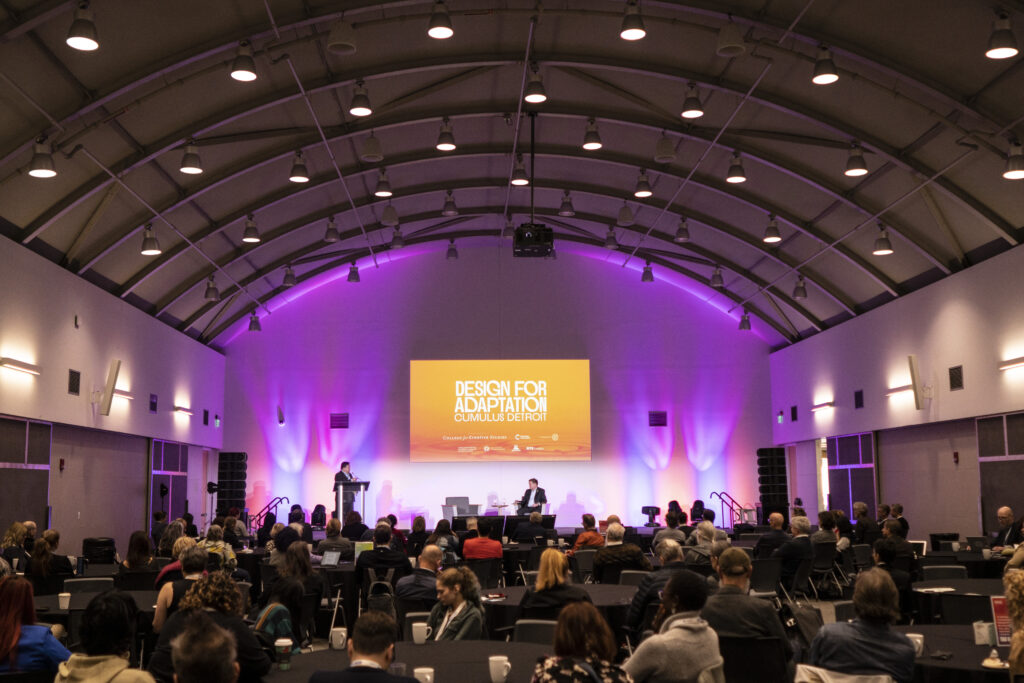
Cumulus, a global association of art and design education and research, held its annual conference, Design for Adaptation in Detroit Nov. 1-4 at the College for Creative Studies. This marks only the second time in its 30-year history that the conference was in North America. Cumulus connects 350 member institutions across 63 countries to exchange knowledge and best practices to elevate the positive role of designers and artists in creating sustainable and humane futures for all. “If there is one thing we know, we are stronger together,” said Terry Barclay, SBN Detroit Chair and CEO of Inforum, in a Thursday afternoon welcome address. “I think we have a common sense of urgency to break down silos that slow collaboration and this conference is certainly about that.” SBN Detroit was a conference sponsor. “This international conference has such diverse participation,” said Neil Hawkins, president of the Fred A. and Barbara M. Erb Family Foundation, who moderated a keynote address. We have creative designers hoping to change the trajectory of climate disasters. We have local Detroit leaders demanding justice for people already suffering impacts. We have great minds from all corners of the earth here in Detroit, which in many ways can be called ground zero for the climate crisis.” To that end, he noted that metro Detroit has endured serious local flooding from three 500-year rainfalls in the last ten years, holds 25% of the world’s surface freshwater in the great lakes, and the state is fittingly named after a natural resource – Michigan meaning “big lake.” Ian Lambert, co-chair and submissions chair for Cumulus 2022 and also dean of graduate studies at the College for Creative Studies, said, “As the only UNESCO-designated city of design in the U.S., Detroit has an incredible history of makers and manufacturing and design, so it’s fitting that Cumulus was held here. And it’s huge for Detroit.” The conference – focusing largely on the issue of climate change, automation, and income inequality – explored the role designers play in fostering adaptation through a wide range of approaches, methods, visions, and experiments. In that vein, the mission is to think ahead to catalyze ideas to reduce vulnerabilities and foster resilience for communities. Noting that the world is 1.2 degrees Celsius warmer than at any point in human civilization and that 300 billion tons of carbon have been added to the atmosphere by humans, keynote speaker Mikko Ollikainen, head of the Adaptation Fund, said to the audience of designers, “You are the minds to shape the future and you have your work cut out for you. … “We are facing an increasing arrival of uncertainty and must be prepared for things we do not expect and prepared to withstand shocks.” Land use and its relationship to climate change and inequity were the focus of several panels. Anika Goss, CEO of Detroit Future City, said in her keynote, “When we look at the cities in Detroit and around the world that are hit hardest by climate change, it’s always the poorest and the brownest neighborhoods.” She pointed to a community on the lower east side that suffered stormwater flooding as an example, saying, “From an economic standpoint these families continue to lose value in their homes and property simply because they live in a neighborhood with poor infrastructure.” The Eastside Community Network is working to put residents in charge of enhancing their neighborhoods toward resiliency. President Donna Given referenced its LEAP Sustainability Fellowship saying, “When you give someone a small amount of money and the responsibility to build a better space it’s amazing what that can do to a neighborhood.” The fellowship is a training and development program where fellows develop community projects, apply for grant funds to support them, and then implement them with the help of the community. To that end, Jerry Hebron, executive director of Oakland Avenue Urban Farm, shared her story of growing up near Motown in its heyday, leaving the city, and then returning in 2005 to find it riddled by crime and decayed. She became an activist and was charged to find out what needs the community had. “I knocked on doors to collect information and found that housing and food were the residents’ most important needs.” The high vacancy rate and open land equaled opportunity. The community wanted a garden and they built one – 20×20 feet. Today, 14 years later, they are farming 3.5 acres, a farmers market, youth programming, and more. “The community reclaimed that land and worked together to change their neighborhood.” Linking this back to design, Lambert and Leslie Tom, chief sustainability officer at the Charles H. Wright Museum of African American History, presented a collaboration involving the repurposing of three dying trees on the museum’s property. Instead of letting the trees end up in a landfill, The Wright and the Center for Creative Studies repurposed the trees and created a curriculum around co-design for sustainability, climate justice, and African American material culture, out of which came a narrative around how two neighbors – a museum and an art school – set a precedent for climate justice art. “One of the pieces a student created spoke to land use in Detroit by combining window panels from an abandoned home and the repurposed timber to tell the story of decay and rebuild,” Lambert said. There is no doubt that the complex consequences of climate change have pushed the need for community resilient strategies to emerge and thrive in the face of change. About the role designers play in this, Ollikainen said, “How designers see the world and work has a profound impact on building sustainable solutions. You have the vision, and you have the skills to turn that vision into reality.” Be sure to subscribe to our newsletter for regular updates on sustainable business practices in and around Detroit.
College for Creative Studies Launches Graduate Program Toward Developing Leaders in Climate Action
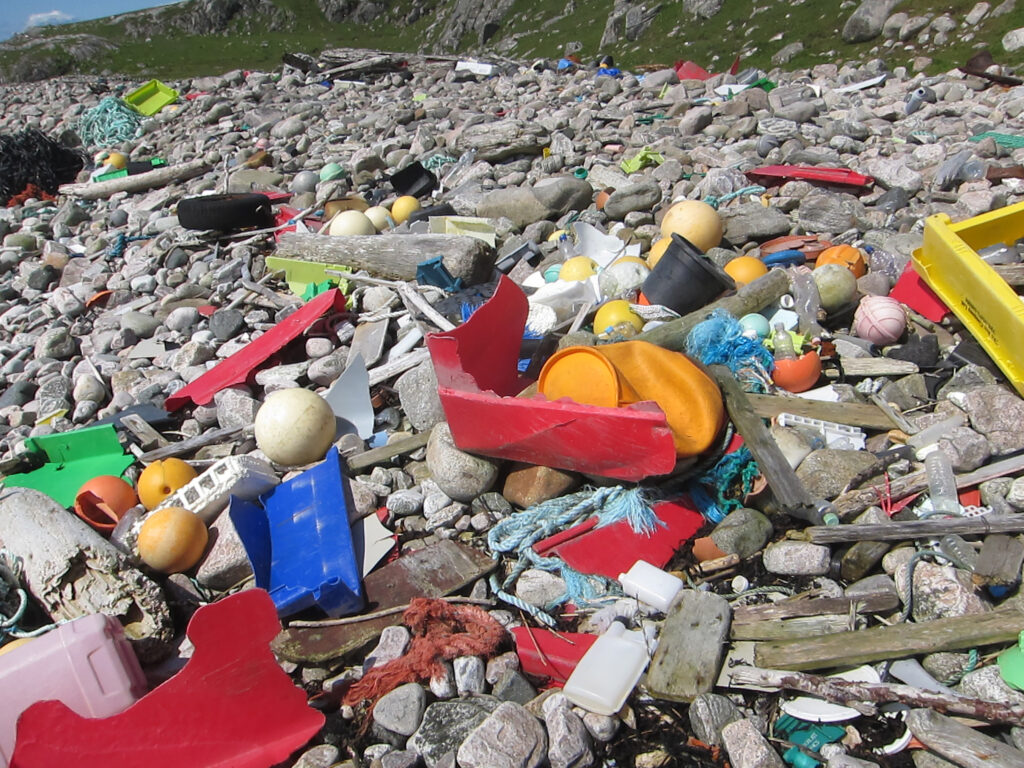
In the fall of 2023, the College for Creative Studies will launch Design for Climate Action – a new graduate program aimed at tackling the global climate action and change emergency from multiple angles. The program invites applications from designers and non-designers of all kinds, bringing together broad multidisciplinary mindsets for interdisciplinary collaboration. It will foster an understanding of zero-waste materials and processes, circular economies, civic infrastructures, and environmental stewardship. At its heart is the drive to bring about change in existing systems and transition to structures that reverse global heating and uphold climate justice and global equity. Leading the program is Dr. Ian Lambert, Dean of Graduate Studies & Research. Lambert is a designer and maker-researcher with extensive experience in academic leadership and curriculum development in higher education in the U.K., the U.S., and China. Lambert has taught sustainable design for more than 20 years and his work with ocean plastic in Scotland along with other waste streams is widely published. He has brought his work with ocean plastic to the Great Lakes and recently joined the Detroit River Coalition. For the last two years, he has been collaborating with the Charles H. Wright Museum of African American History on the d.Tree Studio – diverting dying trees from landfills to become narrative artifacts that elevate climate justice. He is a Fellow of the Royal Society of Arts, and a former advisor to the Creative Conscience Awards. SBN Detroit spoke to Lambert about the program. Q: What is the impetus behind the new Design for Climate Action Master’s Program? A: In addition to further embedding sustainability across the CCS curriculum, we are looking to highly specialize in addressing the climate crisis. This is about working toward and educating about systemic change. There are many perspectives required in tackling climate action, so the program is about foregrounding design thinking at the intersection of multiple disciplines. The program welcomes scientists, engineers, philosophers, and sociologists as well as designers and other creatives. It is the synergy formed by these different skill sets that can drive change in the climate crisis. It’s important to remember that while science presents the facts and explains what is happening, the climate crisis is a cultural crisis, a social crisis, an economic crisis, and a political crisis. It affects humankind in many different ways and it’s not just for scientists to solve. The program takes the position of stating climate problems calmly and rationally. We need to use intelligent and persuasive narratives to bring others, including business leaders and politicians, with us. The debate is often highly polarized, which is dangerous. So, it is important to temper our outrage and avoid alienating those across the divide. Q: What does it mean for CCS to offer this program? Is this kind of curriculum unique to design school offerings? A: The program is focused on action in the climate crisis and systemic change. I don’t know of any other program that takes such a multidisciplinary approach with design at its hub. Also, our grad program is growing, and part of our strategy is to consider where the needs are and identify opportunities for aligning with the activity that’s happening in Detroit. Essentially the program has three pillars that overlap and blend: The circular economy and closed-loop manufacturing and material cycles. Systems and infrastructures – How we can redesign these or make interventions and design out waste? Environmental stewardship and understanding the lasting effects of human production on our environment Q: What implications might this have for the Detroit businesses – graduates with this skill set and education coming into the workforce? A: A recent report in the Atlantic stated that the government will be spending $374 billion on fighting climate change, and some are estimating it will reach $800 billion. This will require experts of all kinds to implement and lead change within businesses, corporations, and public organizations. Experts who can galvanize collaboration and take action in multiple ways. The demand for climate design experts is only going to grow, and our graduates will go into the world with not only the expertise but the passion and capability to apply a persuasive narrative to bring about these changes. Q: Can you tell us more about bringing together broad multidisciplinary mindsets for interdisciplinary collaboration? A: At the graduate level all design programs operate at disciplinary intersections. The climate change crisis is omnipotent, and the key to this (working to solve it) is being capable of working with other areas of expertise. This is not a crisis to be dealt with by lone crusaders. It truly requires collaboration that is deep and expansive. So it’s really important to develop students into leaders who can advance this approach. When it comes to leadership, there is this concept of the T-shaped individual, where the vertical bar on the letter T represents the depth of related skills and expertise in a single field, and the horizontal bar is the ability to collaborate across disciplines with experts in other areas and to apply knowledge in areas of expertise other than one’s own. And then there are X-shaped individuals, with “executive” skills and deep expertise in a core knowledge area as well as strong leadership skills and credibility. We need both T-shaped and X-shaped skill sets to approach and address the climate crisis, and our program will work toward building these. Q: Will the students be involved in sustainability programs and projects in Detroit? A: CCS has an extensive and well-established set of partnerships and connections with industry and our students work on many sponsored and live projects. Currently, students are working with Consumers Energy to help implement EV charging services from a user experience perspective. Last year, our students worked with the Charles H. Wright Museum of African American History on redirecting dying trees from landfill to narrative objects. Our students have worked on clean air projects, food waste diversion, water security, sustainable tourism, and green mobility systems, to name a few. I’m also very proud of the CCS Color and Materials Design Students who
A Focus on Decreasing Food Waste in Detroit

Motown Museum Chairwoman and CEO Robin Terry Speaks on the Design, Vision, and programming and how it will impact the city of Detroit.
How Does Consumers Energy Activate Around People, the Planet, and Prosperity?
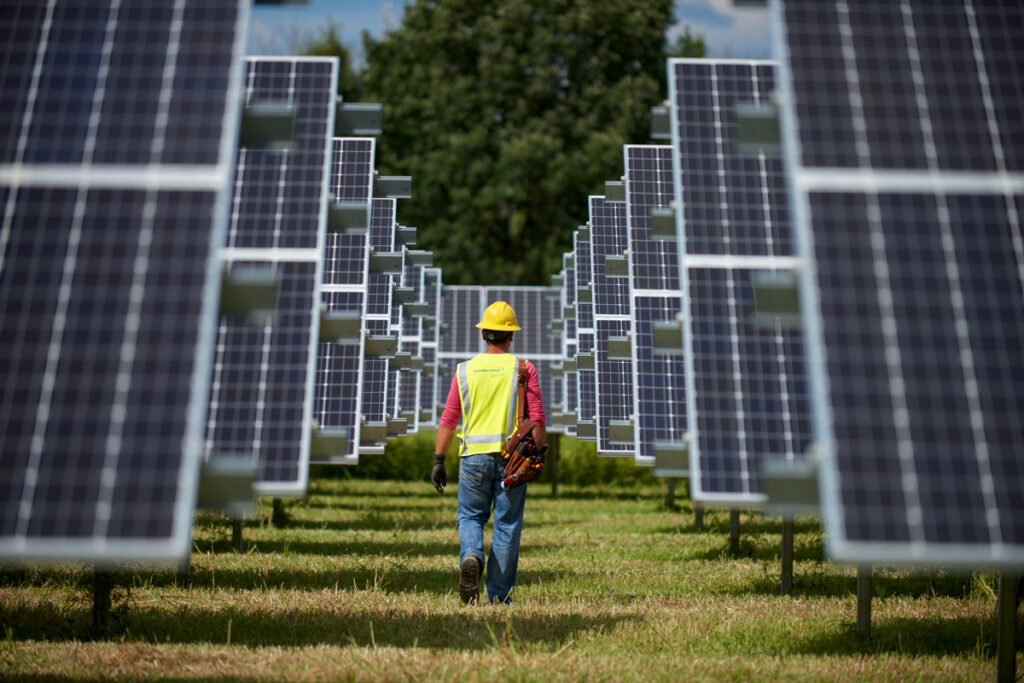
How does Consumers Energy, which provides natural gas and electricity to 6.7 million of Michigan’s 10 million residents, with 8,000+ staff members, approach sustainability? SBN Detroit spoke to Brandon Hofmeister, Senior Vice President of Governmental, Regulatory and Public Affairs for CMS Energy and Consumers Energy, about how the company executes its sustainability goals and about some of its current projects. Q: When did you begin sustainability efforts at Consumers Energy? A: From a very broad sense, the company has been focused on sustainability since it was founded. Our current intentional focus to prioritize sustainability specifically within our corporate strategy has been around for about a decade. Q: What is the organizational structure around executing your sustainability goals? A: Our corporate strategy is centered around a triple bottom line of people, planet, and prosperity with measurable goals that cascade down throughout the whole business and that are embedded in everything we do. We don’t necessarily source it to one department or team. We do have an Environment and Sustainability Council that includes top leaders and executives and officers who meet regularly to monitor progress toward key sustainability goals. We also have a Chief Diversity Officer and a focus on diversity, equity, and inclusion, and this overlaps and encompasses our sustainability objectives. It’s very cross-functional – everyone owns it and it’s embedded within all roles and levels of the company. Q; Please give some examples of initiatives and priorities in place around people, planet and prosperity. A: Regarding the planet, I would say our biggest initiative is transforming our electricity generation mix. We will retire our remaining coal plants in 2025 and move completely to clean energy, reducing carbon emissions by 60% from 2005 levels. This is a very aggressive goal but as a company, we are excited about it. From a people perspective, we are focused on dramatically improving electric reliability by hardening systems to stand up to more intense storm activity and leveraging best practices in technology and management to reduce outages. We are also deeply focused on the affordability of our services. We’re doing a lot of work to create payment and assistance and energy efficiency programs. We are also dedicated to finding ways to take cost out of our processes and the cost we pass on to our customers, so they get the best value for the services provided. This is equally important for our business customers. We must make sure electricity is cost-effective so businesses can continue to thrive and create jobs here in Michigan. Regarding prosperity, part of the triple bottom line is keeping our own business healthy and profitable for our staff and also our investors. We are expected to deliver consistent and low-risk financial results and that affects our community and the economy overall. Q: Consumers Energy employs more than 8,000 people. How do you share the vision and facilitate action? A: How we approach the goals in itself is important and I think has been impactful. We set breakthrough goals and unleash the team to find new and innovative solutions. It is challenging to set goals that we don’t yet know how to achieve, but this can also be very inspiring, as long as you give the “why” behind the goal. Our team inherently works for our friends and neighbors, and we want to deliver for them. So, whether it’s decreasing carbon emissions or increasing electric reliability, we set goals, give the why, and then let the power of the people take it forward. The outcomes are often quite remarkable and solutions we never thought possible are unveiled. Q: What do you think is one of the most impactful sustainability practices you’ve put into place to date? A: Our clean energy program is a good example. We set an ambitious goal to get to net zero carbon emissions by 2040. Within the framework of conventional wisdom, this originally appeared to be impossible. But the goal has opened up new ways of thinking. Retiring the coal plants was originally slated for 2040, but that’s been moved up to 2025 as I mentioned. We have a north star to reach and are working on this carbon goal every day. Q: What do you point to as an impactful project you are putting into place in the next three to five years? A: Electrification of vehicles is a big game changer for our industry. The company has a breakthrough goal to have a million EVs in service by 2030. This is great for the planet and great for our customers’ pocketbooks. The more electricity we all use, the more electric bills decrease. There are set costs for infrastructure, and if more people are using that infrastructure the cost per unit of electricity goes down. So, it’s a win-win. Q: How do you integrate the community and keep them informed? A: This is a huge part of our work. We spend a lot of time communicating what we are working on and why, but it’s a two-way street. We also want to understand the people and community we serve, so we conduct formal and informal stakeholder outreach. We do materiality assessments internally and externally. We engage customers and educate them on how they can save energy by considering an electric vehicle or participating in renewable energy programs. Most people don’t think about their utility service unless the power out goes out, but it’s important to continually communicate our broader mission. We spend time engaging in a variety of channels with customers to have two-way communication. Q: What advice would you give to SE Michigan businesses when it comes to laying out sustainability goals and achieving them? A: Start with what’s important to the business. Understand the impact the business is having and focus on a goal. Also engage stakeholders. Set ambitious goals and always communicate the why. It’s easier to bring people in when they are engaged versus being told. And finally, don’t have too many goals. Prioritize, set a few very ambitious and solid goals,


